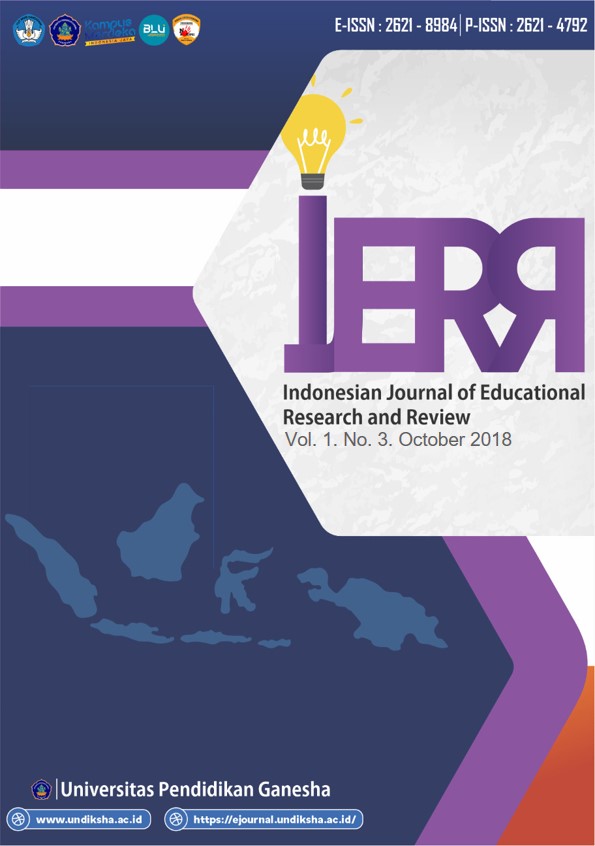HUBUNGAN MOTIVASI BELAJAR DENGAN KEMATANGAN KARIR SISWA XI TEKNIK AUDIO VIDIO SMK NEGERI 2 SALATIGA
DOI:
https://doi.org/10.23887/ijerr.v1i3.16357Abstrak
This study aims to determine the significance of the relationship between learning motivation and career maturity in the students of Class XI Audio Vidio (TAV) in Salatiga Vocational High School number 2 . This type of research is a correlation consisting of two variables: learning motivation and career maturity. The subjects of this study were students of class XI TAV (A and B) totaling 66 people through total sampling technique. Data collection for both variables using a questionnaire. Analysis using Kendall Tau technique. From the results of data analysis, the correlation coefficient (r) between the variables of learning motivation and student career maturity was obtained at r = 0.735 and p value 0.000. Shows that learning motivation contributes positively and significantly to students' career maturity. A positive and significant relationship between learning motivation and career maturity in class XI students of Salatiga Vocational High School number 2. The conclusion of this study is that the higher the learning motivation, the higher the student's career maturity, and vice versa.
Keywords: Learning Motivation, Career Maturity
Referensi
Afitriyani, Tabita Mia. 2016. Hubungan Motivasi Berprestasi Dengan Kematangan Karir Pada Mahasiswa Angkatan 2012 Fakultas Sains Dan Matematika. Salatiga : Universitas Kristen Satya Wacana.
Apriansyah, Supriatna Sidik. 2014. Hubungan Antara Prestasi Belajar dengan Perencanaan Karir. Yogyakarta : Universitas Ahmad Dahlan.
Arikunto. 2006. Prosedur Penelitian Suatu Pendekatan Praktek. Jakarta : PT. Rineka Cipta.
Corey, G & Corey. 2006. I Never Knew I Had A Choice : Exploration In Personal Growth (8th ed). United States Of America: Thomson brooks Jemmars.
Djamarah, Syaiful Bahri. 2011. Psikologi Belajar. Jakarta : Rineka Cipta.
Istiqomah, Inarotul.2014 . Hubungan Antara Motivasi Belajar Dengan Perencanaan Karir Siswa Kelas VIII SMP Negeri 3 Satu Atap Kedung Jati. Salatiga : Universitas Kristen Satya Wacana.
Juwitaningrum, Ita. 2016. Program Bimbingan Karir untuk Meningkatkan Kematangan Karir Siswa SMK. Yogyakarta : Universitas Ahmad Dahlan .
Mar’atur Rafiqah.2013.” Pengaruh Motivasi Belajar Terhadap Prestasi Belajar”. Jurnal Bimbingan Konseling FKIP Universitas Lampung Vol 2 No 1.
Partino, H R. 2006. Kematangan Karir Siswa Sma. Yabansai. Universitas Cenderawasih.
Priyatno, Dwi. 2012. Mandiri Belajar Analisis Data Dengan SPSS. Yogyakarta: Media Kom
Rachmawati, Y. E. 2012. Hubungan antara Self-efficacy dengan Kematangan Karir pada Mahasiswa Tingkat Awal dan Tingkat Akhir di Universitas Surabaya. Surabaya : Universitas Surabaya
Santrock, John W. 2002. Life-span Development : Perkembangan Masa Hidup. Edisi 5 jilid 2, Jakarta : Erlangga
Sardiman. 2001. Interaksi dan Motivasi Belajar Mengajar. Jakarta: Grafindo Persada
Siagian, Sondang P. 2016. Manajemen Sumber Daya Manusia. Jakarta : Bumi Aksara
Sugiyono. 2012. Statistik untuk Penelitian. Bandung: Alfabeta.
Suprihatin ,Siti. 2015. ”Upaya Guru Dalam Meningkatkan Motivasi Belajar Siswa”. Jurnal Pendidikan Ekonomi UM Metro Vol.3.No.1 (2015) 73-82
Suranto. 2015. “Pengaruh Motivasi, Suasana Lingkungan Dan Sarana Prasarana Belajar Terhadap Prestasi Belajar Siswa (Studi Kasus Pada Sma Khusus Putri Sma Islam Diponegoro Surakarta). Program Studi Pendidikan Akuntansi. Jurnal Pendidikan Ilmu Sosial, Vol 25, No.2, Desember 2015.
Sukardi Dewa Ketut, 2004. Pengantar Pelaksanaan Program Bimbingan dan Konseling di Sekolah. Jakarta : Reneka Cipta
Tyas. Prasetyaning, dkk. 2012. Hubungan antara Motivasi Belajar dan Keyakinan Diri dengan Kematangan Karir pada Siswa SMK Muhamadiyah 2 Andong Boyolali. Solo : Universitas Sebelas Maret
Walgito, Bimo. (2004). Bimbingan dan Konselin. Yogyakarta: C.V. Andi Offset.
Wijaya, Fitria. 2009. Hubungan Antara Kematangan Karir dengan Motivasi Belajar pada Siswa Kelas X MAN Cibinong. Depok : Universitas Gunadarma.
Winardi, J. (2001). Motivasi dan Pemotivasian dalam Manajemen. Jakarta: Raja Grafindo Persada.
Winkel. W.S. dan Hastuti, 2004. Bimbingan dan Konseling di Institusi Pendidikan. Yogyakarta: Media Abadi.
Yamin, M. 2008. Stretegi Pembelajaran Berbasis Kompetensi. Ciputat: Gaung Persada Press.
Unduhan
Diterbitkan
Cara Mengutip
Terbitan
Bagian
Lisensi
Authors who publish with the Indonesian Journal of Educational Research and Review (IJERR) agree to the following terms:
- Authors retain copyright and grant the journal the right of first publication with the work simultaneously licensed under a Creative Commons Attribution License (CC BY-SA 4.0) that allows others to share the work with an acknowledgment of the work's authorship and initial publication in this journal.
- Authors are able to enter into separate, additional contractual arrangements for the non-exclusive distribution of the journal's published version of the work (e.g., post it to an institutional repository or publish it in a book), with an acknowledgment of its initial publication in this journal.
- Authors are permitted and encouraged to post their work online (e.g., in institutional repositories or on their website) prior to and during the submission process, as it can lead to productive exchanges, as well as earlier and greater citation of published work. (See The Effect of Open Access)












